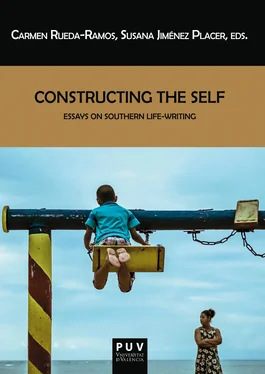With his focus on citizenship, Washington constructs his autobiography, as did Franklin, primarily by working through his educational and business achievements, downplaying personal matters and intimate relationships (for instance, Washington names his wives but says very little about them). His discussions, following Franklin’s emphasis on the self-made man, typically focus less on the attainments themselves than on the efforts needed to achieve them. In describing how he overcame the many obstacles facing him, both as an individual and as a leader of Tuskegee (and more generally as one of the most important representatives of African Americans), Washington points to the two issues that best define the vision that everywhere shapes his autobiography: the importance of practical education and of meaningful labor—that is, of doing a job well.
Washington’s portrayal of his childhood and young adulthood concentrates on the incidents that bring him to understand the importance of education and work, which by the end of the autobiography become for all intents and purposes one and the same (work is education, education is work). No episode is more important than the young Washington’s employment by Mrs. Viola Ruffner, a Yankee whose exacting work standards had run off all of her previously hired helpers. Mrs. Ruffner demanded punctuality, honesty, and commitment; everything must run smoothly and orderly. No exceptions, no excuses. “The lessons that I learned in the home of Mrs. Ruffner,” Washington declares in Up From Slavery , “were as valuable to me as any education I have gotten anywhere else. . . . I never see a filthy yard that I do not want to clean it, a paling off of a fence that I do not want to put it on, an unpainted or unwhitewashed house that I do not want to paint or whitewash it, or a button off one’s clothes, or a grease-spot on them or on a floor, that I do not want to call attention to it” (44). Another formative event occurs when Washington shows up unannounced and un-admitted at Hampton Institute in Richmond (having struck out on his own from West Virginia, a journey paralleling Franklin’s youthful bolt from Boston to Philadelphia). He is eventually admitted to Hampton not because of classroom achievement but because of his meticulous sweeping up of a room. “The sweeping of that room was my college examination,” Washington writes, “and never did any youth pass an examination for entrance into Harvard or Yale that gave him more genuine satisfaction. I have passed several examinations since then, but I have always felt that this was the best one I ever passed” ( Up From Slavery 53).
Once enrolled at Hampton, Washington came under the sway of its principal General Samuel C. Armstrong, who had developed a curriculum emphasizing education in both the classroom and the workshop. Perhaps the most important thing that Washington learned at Hampton, as he notes in Up From Slavery , is the dignity of manual labor. Washington repeatedly attacks those who believe that the primary goal of education is to deliver people from manual work. For Washington, education should prepare people for productive labor, whatever the profession. Labor done well not only increases one’s earning potential, it also fosters self-improvement and enrichment. Describing his own growth through productive labor at Hampton, Washington observes:
I not only learned that it was not a disgrace to labour, but learned to love labour, not alone for its financial value, but for labour’s own sake and for the independence and self-reliance which the ability to do something which the world wants done brings. At that institution I got my first taste of what it meant to live a life of unselfishness, my first knowledge of the fact that the happiest individuals are those who do the most to make others useful and happy. (73-74)
In all this, Washington sounds a good bit like Franklin, who portrayed himself in his Autobiography as endlessly seeking practical projects to which he could devote himself, such as the creation of better streetlamp. Concerning these projects, Franklin might be understood as the Great Improver, with his efforts directed at bettering himself as well as his society, a perspective resting on the idea that moral virtues are reflected in and reinforced by habits of work. Following Franklin, Washington emphasizes the necessity of labor in improving black people as they progress “up from slavery.” Indeed, Washington argues that perhaps the most heinous legacy of slavery was its vilifying of labor, not only for blacks but also for whites; and so, in order to construct a more prosperous South, both races needed to embrace the importance of manual labor. “The whole machinery of slavery,” Washington asserts, “was so constructed as to cause labour, as a rule, to be looked upon as a badge of degradation, of inferiority. Hence labour was something that both races on the slave plantation sought to escape. The slave system on our place, in a large measure, took the spirit of self-reliance and self-help out of the white people” ( Up From Slavery 17). To Washington’s eyes, blacks rather than whites were better fitted for the hard work needed to remake the South, since most slave owners “had mastered no special industry,” while many slaves “had mastered some handicraft” (18).
Although Washington worked surreptitiously to support various political causes, including voting rights, he publically advocated for social reform through economic advancement rather than political agitation, with impoverished blacks, through education and hard work, achieving financial independence. Not surprisingly, this advocacy came under withering attack from many black leaders, particularly those from the North, including most famously W. E. B. Du Bois; and that criticism only grew after Washington’s death, reaching a crescendo during and after the Civil Rights movement. But as a number of recent historians have pointed out, Washington’s options for improving the South’s black populace during his lifetime were extremely limited. As even Washington’s biographer Louis R. Harlan has noted, “understanding Washington’s message requires an understanding of the era in which he sent it. It was the worst time for black people since slavery, a time of lynchings, race riots, personal humiliations, disenfranchisement, and the deepening and spreading of segregation” (“ Up From Slavery as History and Biography” 29-30). David Leverenz has observed that “Washington was not interested in what [Orlando] Patterson has recently called ‘macho suicide.’ Instead of directly confronting the terrorizing practices that preserved white power and privilege, Washington performed a manliness based on self-control and mastery” (160). Such self-control and mastery, as presented in his autobiographies, came only through diligence and hard work, manual and otherwise; photographs of Washington, which were carefully posed and edited (he hired the best photographers available), typically show him either working in a garden or field, suggesting from where he had come, or sitting in dignified pose, suggestive of where his hard work had brought him.
Political agitation, on the other hand, was for Washington a seductive temptation that drew southern blacks away from what he characterized as “the more fundamental matters of perfecting themselves in the industries at their doors and in securing property” (85). Washington believed that blacks and whites could be brought together through economic rather than social relations; that is, as blacks became more skilled as workers, their work would become more valued and appreciated by whites, despite their ingrained racial prejudice. That appreciation would over time evolve into respect, human nature overcoming social conditioning. “My experience is that there is something in human nature which always makes an individual recognize and reward merit, no matter under what colour of skin merit is found,” Washington observes at one point in Up From Slavery (154), and at another he discusses a speech that he had given summarizing the logic of his economic-social gospel:
Читать дальше












